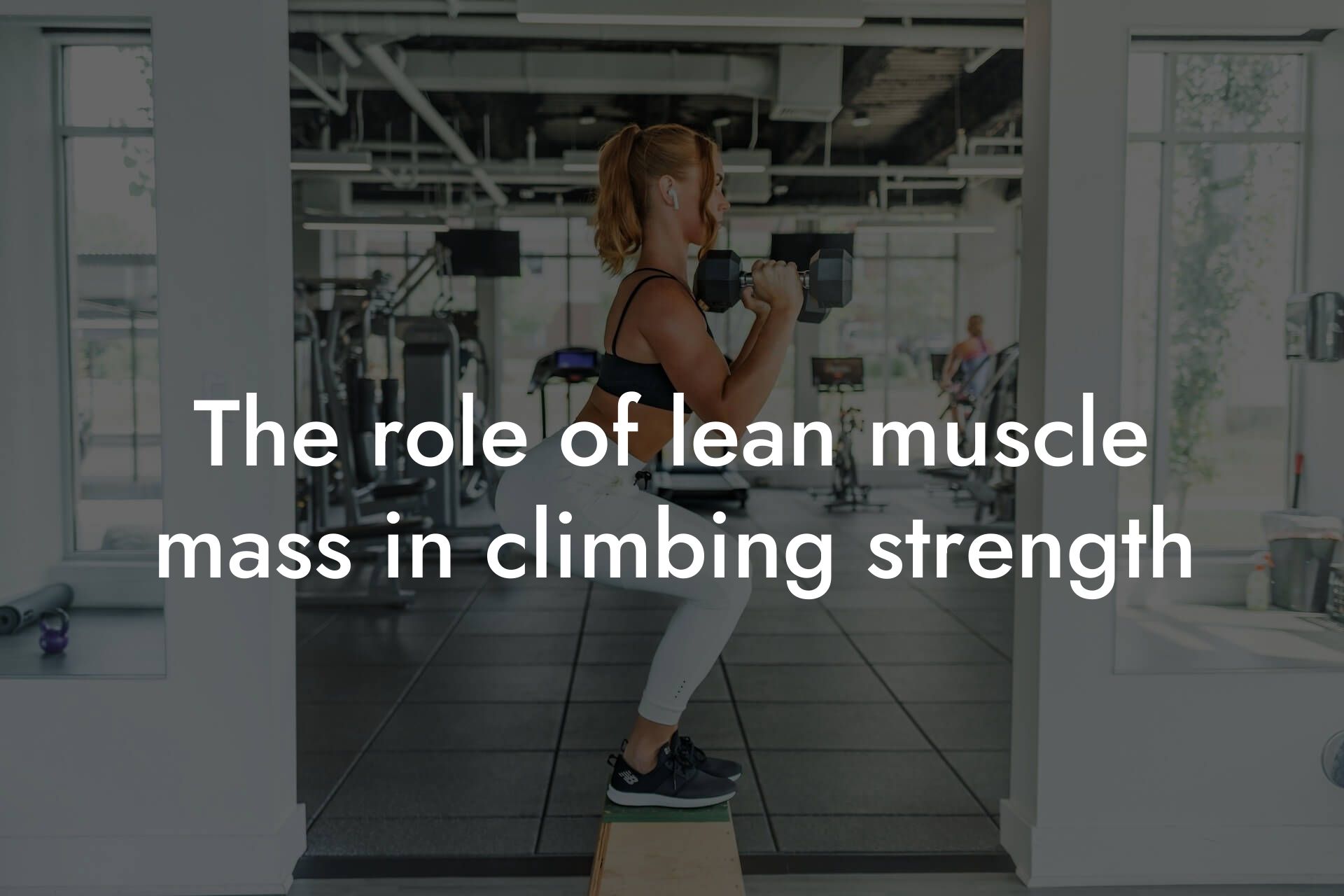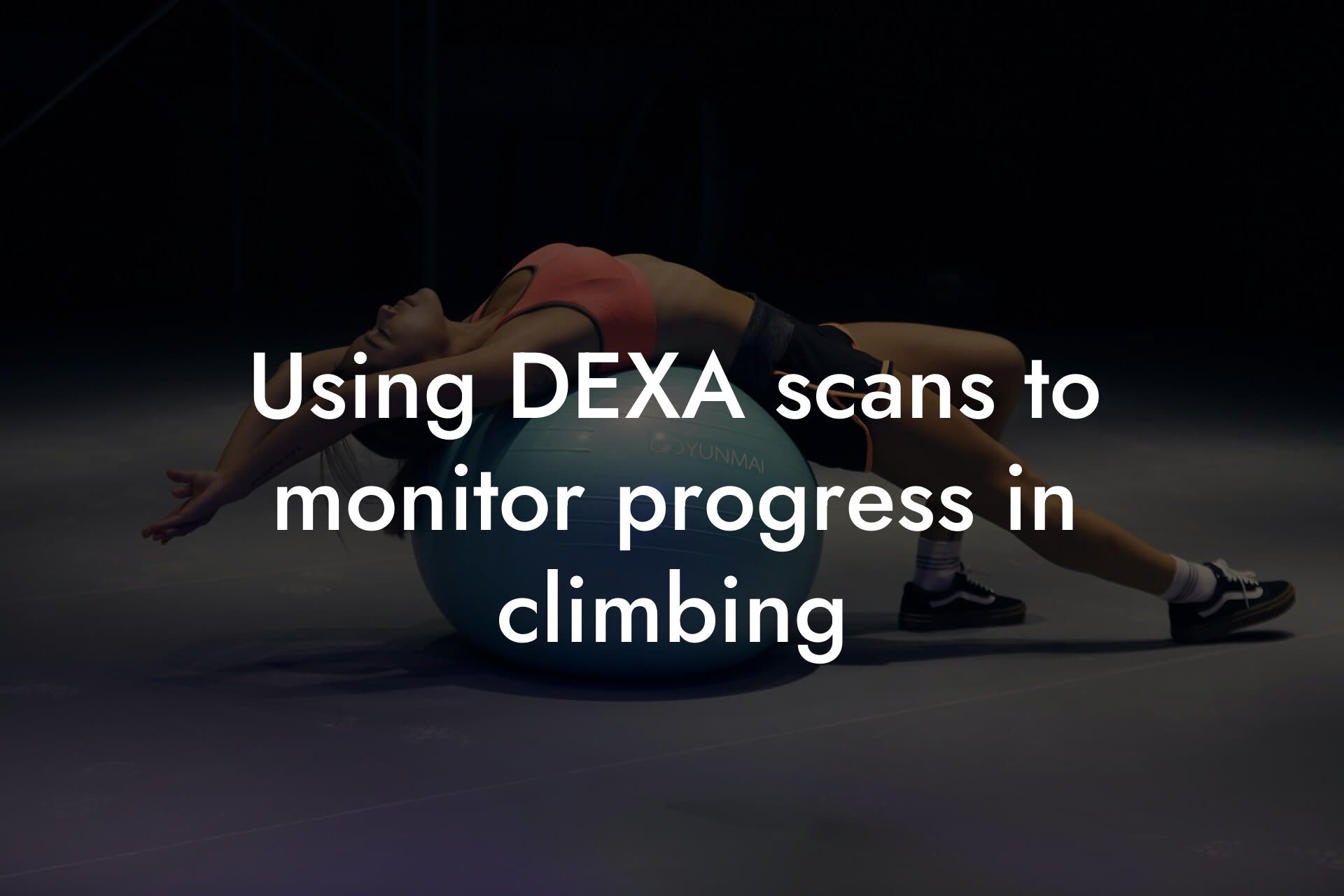Why Body Fat Matters in Climbing
As a climber, you know that every extra pound of body fat can make a significant difference in your performance. Carrying excess fat can decrease your power-to-weight ratio, making it more challenging to complete routes and reach the summit. Moreover, excess body fat can also increase your risk of injury, as your joints and muscles have to work harder to support the extra weight. Reducing body fat can help you climb more efficiently, increase your endurance, and reduce your risk of injury.
Table of Contents
- Why Body Fat Matters in Climbing
- The Importance of Body Composition Analysis
- Understanding Body Fat Percentage
- How to Reduce Body Fat for Climbing
- Macronutrient Breakdown for Climbers
- Meal Planning and Snacking for Climbers
- Common Mistakes Climbers Make When Trying to Reduce Body Fat
- Frequently Asked Questions
The Importance of Body Composition Analysis
Before you start working on reducing your body fat, it's essential to understand your current body composition. A body composition analysis can provide you with a detailed breakdown of your lean mass, fat mass, and bone density. This information can help you identify areas for improvement and track your progress over time. At Tano Performance Group, we use a DEXA machine to provide our clients with a comprehensive body assessment, giving them a clear understanding of their body composition and a roadmap for improvement.
Understanding Body Fat Percentage
Body fat percentage is a measure of the amount of fat in your body compared to your lean mass. For climbers, a lower body fat percentage is generally desirable, as it can improve power-to-weight ratio and reduce the risk of injury. A body fat percentage of 10-15% is considered ideal for male climbers, while a percentage of 16-20% is considered ideal for female climbers. However, it's essential to remember that body fat percentage is just one aspect of overall health and fitness.
How to Reduce Body Fat for Climbing
Reducing body fat for climbing requires a combination of proper nutrition, consistent training, and patience. Here are some tips to help you get started:
Create a calorie deficit: To lose body fat, you need to consume fewer calories than you burn. Aim for a daily calorie deficit of 500-1000 calories to promote weight loss while preserving lean mass.
Increase your protein intake: Protein is essential for building and repairing muscle tissue. Aim for 1.2-1.6 grams of protein per kilogram of body weight to support muscle growth and repair.
Incorporate strength training: Building lean mass through strength training can help you lose body fat and improve your overall climbing performance. Focus on exercises that target multiple muscle groups at once, such as squats, deadlifts, and lunges.
Incorporate cardio exercises: Cardio exercises such as running, cycling, or swimming can help you burn calories and improve your cardiovascular endurance. Aim for at least 150 minutes of moderate-intensity cardio per week.
Macronutrient Breakdown for Climbers
As a climber, your macronutrient breakdown should be tailored to your specific energy needs. Here's a general breakdown of the macronutrients you should aim for:
Carbohydrates: 2-3 grams per kilogram of body weight
Protein: 1.2-1.6 grams per kilogram of body weight
Fat: 0.5-1 gram per kilogram of body weight
Hydration is also critical for climbers, as even mild dehydration can impair performance. Aim to drink at least 8-10 glasses of water per day.
Meal Planning and Snacking for Climbers
Meal planning and snacking are critical components of reducing body fat for climbing. Here are some tips to help you get started:
Plan your meals: Aim to plan your meals at least a week in advance to ensure you're getting the nutrients you need.
Incorporate healthy snacks: Healthy snacks such as nuts, fruits, and energy bars can help you stay fueled and satisfied between meals.
Avoid processed foods: Processed foods are often high in sugar, salt, and unhealthy fats. Aim to limit your intake of processed foods and focus on whole, nutrient-dense foods instead.
Common Mistakes Climbers Make When Trying to Reduce Body Fat
When trying to reduce body fat for climbing, it's easy to make mistakes that can hinder your progress. Here are some common mistakes to avoid:
Crash dieting: Crash dieting can lead to muscle loss, decreased performance, and a higher risk of injury. Instead, focus on making sustainable lifestyle changes that promote gradual weight loss.
Overtraining: Overtraining can lead to fatigue, decreased performance, and a higher risk of injury. Make sure to listen to your body and take rest days as needed.
Inadequate nutrition: Inadequate nutrition can lead to decreased performance, fatigue, and a higher risk of injury. Make sure to fuel your body with the nutrients it needs to perform at its best.
Reducing body fat for climbing requires patience, dedication, and a willingness to make sustainable lifestyle changes. By understanding your body composition, creating a calorie deficit, incorporating strength training and cardio exercises, and fueling your body with the right nutrients, you can improve your climbing performance and reach your goals. Remember to avoid common mistakes such as crash dieting, overtraining, and inadequate nutrition, and don't be afraid to seek help from a healthcare professional or registered dietitian if you need guidance. At Tano Performance Group, we're committed to helping high-earning professionals like you achieve their fitness goals and take their business to the next level. Contact us today to learn more about our DEXA machine and comprehensive body assessment services.
Frequently Asked Questions
What is the ideal body fat percentage for climbers?
For climbers, a body fat percentage between 10-15% for men and 15-20% for women is considered ideal. This range allows for optimal power-to-weight ratio, improved mobility, and enhanced overall climbing efficiency.
How does excess body fat affect climbing performance?
Excess body fat can negatively impact climbing performance by increasing overall weight, reducing power-to-weight ratio, and decreasing mobility. This can lead to fatigue, decreased endurance, and a higher risk of injury.
What are the benefits of reducing body fat for climbing?
Reducing body fat can improve climbing efficiency, increase power-to-weight ratio, enhance mobility, and boost overall performance. It can also reduce the risk of injury, improve mental focus, and increase confidence on the wall.
How do I determine my current body fat percentage?
You can determine your current body fat percentage through various methods, including skinfold measurements, bioelectrical impedance analysis (BIA), dual-energy X-ray absorptiometry (DXA), or hydrostatic weighing. Consult with a healthcare professional or registered dietitian to determine the best method for you.
What is the most effective way to reduce body fat for climbing?
A combination of a healthy, balanced diet and regular cardiovascular exercise is the most effective way to reduce body fat for climbing. Focus on whole, nutrient-dense foods, and aim to create a calorie deficit of 500-1000 calories per day to promote weight loss.
How much cardio exercise do I need to do to reduce body fat?
Aim for at least 150 minutes of moderate-intensity cardio exercise per week, such as jogging, cycling, or swimming. You can also incorporate high-intensity interval training (HIIT) to boost metabolism and burn fat more efficiently.
What types of foods should I eat to reduce body fat?
Focus on whole, nutrient-dense foods such as lean proteins, complex carbohydrates, and healthy fats. Include foods rich in fiber, vitamins, and minerals, such as fruits, vegetables, whole grains, lean meats, and fish.
How can I ensure I'm getting enough protein to support muscle growth and repair?
Aim to consume 1.2-1.6 grams of protein per kilogram of body weight daily, spread across 3-5 main meals and 2-3 snacks. Include protein-rich foods such as lean meats, fish, eggs, dairy, and plant-based options like legumes, nuts, and seeds.
What are some healthy snack options for climbers?
Healthy snack options for climbers include nuts and seeds, dried fruits, energy bars, jerky, and trail mix. Aim for snacks that are high in protein, complex carbohydrates, and healthy fats to provide sustained energy and support muscle growth and repair.
How can I reduce my daily caloric intake to promote weight loss?
To reduce your daily caloric intake, focus on portion control, eat more protein-rich foods, and incorporate healthy fats. Avoid processed and high-calorie foods, and limit your intake of added sugars and saturated fats.
What are some common mistakes climbers make when trying to reduce body fat?
Common mistakes climbers make when trying to reduce body fat include crash dieting, overtraining, and neglecting proper nutrition. Avoid extreme caloric restriction, and focus on sustainable, long-term lifestyle changes that promote overall health and well-being.
How long does it take to notice improvements in climbing performance after reducing body fat?
The time it takes to notice improvements in climbing performance after reducing body fat varies depending on individual factors, such as starting body fat percentage, training program, and nutrition plan. However, most climbers can expect to notice improvements within 6-12 weeks of consistent effort.
Can I reduce body fat too quickly, and is it safe?
Yes, reducing body fat too quickly can be unsafe and potentially lead to muscle loss, nutrient deficiencies, and other health problems. Aim for a slow and steady weight loss of 0.5-1 kg per week for a sustainable and healthy approach.
How can I maintain my current muscle mass while reducing body fat?
To maintain muscle mass while reducing body fat, focus on resistance training exercises, consume adequate protein, and ensure you're getting enough rest and recovery time. Aim to lose weight at a rate of 0.5-1 kg per week to minimize muscle loss.
What role does stress play in body fat reduction for climbers?
Chronic stress can negatively impact body fat reduction efforts by increasing cortisol levels, leading to increased fat storage around the midsection. Engage in stress-reducing activities, such as yoga, meditation, or deep breathing exercises, to help manage stress and support weight loss.
How can I get enough sleep to support body fat reduction and climbing performance?
Aim for 7-9 hours of sleep per night to support body fat reduction and climbing performance. Prioritize a consistent sleep schedule, create a relaxing bedtime routine, and avoid screens and stimulating activities before bedtime.
What supplements can I take to support body fat reduction and climbing performance?
Certain supplements, such as protein powder, creatine, and branched-chain amino acids (BCAAs), can support body fat reduction and climbing performance. However, always consult with a healthcare professional or registered dietitian before adding any new supplements to your regimen.
How can I stay motivated and accountable during my body fat reduction journey?
Stay motivated and accountable by setting realistic goals, tracking progress, and finding a workout buddy or accountability partner. Celebrate small victories along the way, and don't be too hard on yourself if you encounter setbacks.
What are some common myths about body fat reduction for climbers?
Common myths about body fat reduction for climbers include the idea that low body fat is unhealthy, that cardio exercise is the only way to lose fat, and that crash dieting is an effective way to reduce body fat. Educate yourself on the facts, and avoid falling prey to these common myths.
How can I balance my body fat reduction goals with my climbing training?
Balance your body fat reduction goals with your climbing training by prioritizing a well-structured training program, incorporating rest and recovery days, and fueling your body with a balanced diet. Avoid overtraining, and focus on progressive overload and periodization to support overall climbing performance.
What are some resources available to support my body fat reduction journey?
Resources available to support your body fat reduction journey include registered dietitians, personal trainers, and online coaching services. Take advantage of online resources, such as articles, videos, and podcasts, to stay informed and motivated.
How can I maintain my reduced body fat percentage over time?
Maintain your reduced body fat percentage by continuing to prioritize a healthy, balanced diet and regular exercise routine. Avoid complacency, and continue to challenge yourself with new training programs and nutrition plans to support ongoing progress and improvement.
Here are some related articles you might love...
- The role of lean muscle mass in climbing strength
- Using DEXA scans to monitor progress in climbing
- The impact of body composition on climbing performance
- Nutrition strategies for sustained energy during climbs
- Off-season training strategies for climbers
- Balancing strength, endurance, and flexibility in climbing
- Recovery techniques for climbers after intense sessions
- Strength training programs for amateur climbers
- Bone density and injury prevention in climbing
Zak Faulkner
Zak Faulkner is a leading authority in the realm of physical health and body composition analysis, with over 15 years of experience helping professionals optimise their fitness and well-being. As one the experts behind Tano Performance Group, Zak has dedicated his career to providing in-depth, science-backed insights that empower clients to elevate their physical performance and overall health.
With extensive knowledge of DEXA technology, Zak specializes in delivering comprehensive body assessments that offer precise data on body fat, muscle mass, bone density, and overall physique. His expertise enables individuals to make informed decisions and achieve their fitness goals with accuracy and confidence. Zak’s approach is rooted in a deep understanding of human physiology, combined with a passion for helping clients unlock their full potential through personalised strategies.
Over the years, Zak has earned a reputation for his commitment to excellence, precision, and client-focused service. His guidance is trusted by top professionals who demand the best when it comes to their health. Whether advising on fitness programs, nutritional strategies, or long-term wellness plans, Zak Faulkner’s insights are a valuable resource for anyone serious about taking their health and fitness to the next level.
At Tano Performance Group, Zak continues to lead our Content Team revolutionising how professionals approach their physical health, offering unparalleled expertise that drives real results.




